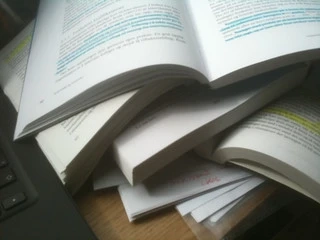An essay is a short treatise on a scientific question. An essay is an explanatory and argumentative essay. Unlike a term paper, the focus is not on the techniques of scientific work, but on a convincing argumentation from the author\'s perspective.
Not in the mood for long texts? Here you can go directly to "Short and concise"
What are the requirements for an essay?
When writing an essay it is important to develop and formulate your own ideas. This should result in an argumentative text about a scientific leading question or thesis. It is important to be brief, to create clarity, and to formulate arguments with little information. A good essay is characterized by the fact that you do not write a string of scientific definitions and theories but can question other points of view or think in new ways. Evidence of quotations and other people\'s ideas is nevertheless essential. In an essay, maintain a relaxed writing style and not a pretentious scientific language, but be careful not to use colloquial language.
In addition, an essay offers you a lot of freedom, including stylistic means such as word games or idioms, but the requirements and specifications also differ from university to university and from lecturer to lecturer. It is best to find out in advance from your supervisor what requirements he or she has for an essay.
How do I write an essay correctly?
I. The correct thesis
As with homework, you pose a scientific question or thesis in an essay before the actual writing process. This guiding question or thesis should take into account a scientific basis, your perspective on your own considerations and the limitations of the topic. Be concrete!
In order to find this guiding question or thesis, it helps to deal with the topic before writing an essay and to pay attention to it specifically: What is your opinion about it? What surprises you? What bothers you? What do you see differently?
II. scope of the literature research
Once the thesis has been established, it is time to take a closer look at literature research. Here opinions differ. On the one hand, not so much literature should be used, so that your topic is "thought up". On the other hand, there are also good arguments for thorough research. So the golden way is to use an essay in the middle. You will find a reference to that middle ground within your course of studies.
III Structure and Order
You should create a central structure for your essay. Basically, the essay follows the structure "Introduction - main part - conclusion". But especially for the main part, you should consider the order in which your arguments should be presented. Think about which arguments are stronger and highlight them. This structure should be made clear by the text, as subheadings are rather unusual in the essay.
Tip 1: Use one paragraph per main idea/argument and formulate smooth transitions.
Tip 2: Use digitization for your own benefit. There is enough outstanding software help for essay writing on the market.
VI. follow-up
After the actual paperwork follows one of the most important points: The follow-up. This includes revising the content, such as spelling, grammar, and punctuation, but you should also check whether your arguments are really convincing or whether there are contradictions in your line of argument.
Think about whether changing the order would improve your argumentation, check whether your arguments can perhaps be strengthened and whether you have sufficiently illuminated the counter-arguments.
As always, it is helpful to have the essay proofread by a third party. Ask your proofreaders specifically whether your arguments are conclusive and whether a comprehensible structure can be seen.
How is an essay structured?
The structure of the essay is actually only divided into introduction, main part and conclusion, whereas you should structure your thoughts and arguments in the main part in a meaningful way
Introduction:
In the introduction, you introduce your leading question or thesis first. Here you should narrow down the topic, indicate your own position, and above all arouse the interest of the reader because if the lecturer is carried away by your topic from the beginning, this will certainly not have a negative effect on the evaluation. It is a good idea to write the introduction at the end of the writing process, as the focus of your essay may still shift during the work.
Main part:
In the main section, you present your argumentation against or for the thesis or leading question. Your position on the topic should be clear and justified in a clear and factual way if you still confuse need essay help uk there are many companies helping students.



